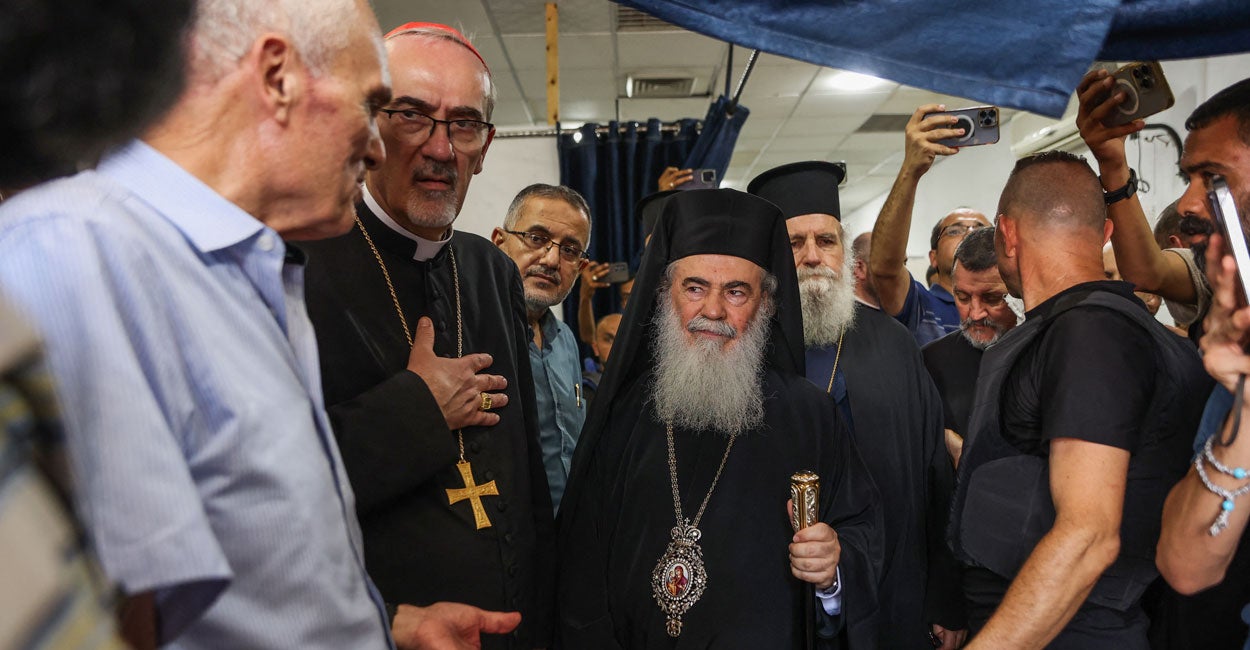


Last month, Israel’s war for survival united the world’s Christian denominations. In Gaza, misfired Israeli munitions struck the enclave’s only Catholic church. The incident led to a joint visit to the church by Jerusalem’s respective Latin Catholic and Greek Orthodox patriarchs in a rare show of solidarity for two denominations separated by a thousand-year schism. Meanwhile in the West Bank, an arson attack on a Byzantine-era church brought condemnation by U.S. Ambassador Mike Huckabee, a vocal Protestant Evangelical.
At a time when Israel stands for Western civilization against the barbarism of Hamas, the majority of the Christian world was briefly aligned in condemning or criticizing Israel at a time when the Jewish state needs Christian friends more than ever.
Israel now has the chance to change its diplomatic strategy to speak to Christianity with one voice by creating an Ambassador for Christian Affairs abroad and a corresponding Minister of Christian Affairs within Israel itself.
Relations between the Jewish state and the Christian world are understandably sensitive. Two millennia of antisemitism in the Christian West and Jerusalem’s ongoing fight with Iran and with jihadist groups like Hamas would understandably make Israel wary of spending time and resources building ties with the Christian world.
At the same time, it is precisely when the weight of history is most acute that it offers the most concrete sense of opportunity. The current Trump administration, an American pope, and the Abraham Accords that are likely to expand could not create a greater sense of urgency for Israel to revamp its diplomacy.
Creating a designated Ambassador for Christian Affairs would give Israeli diplomacy coherence and economy of movement. Presently, Israel’s Ministry of Foreign Affairs has no single designated office that Christian communities abroad can approach, let alone an individual or office with an appreciation of the nuanced relationship between Christianity’s ancient ties with the Holy Land and modern Israel’s Jewish character. Israel is already the safest place in the Middle East to be Christian, and one aspect of Israel’s modern character is its responsibility for safeguarding Christian sites.
A new Ambassador to Christian Affairs could begin within Israel’s current ambassadorship to the Vatican as a parallel position devoted to dialogue and relevant negotiations with the world’s major Christian denominations. Israel formalized relations with the Holy See in the 1990s; and while Catholics have diplomatic primacy, no corresponding position exists for Protestants or Orthodox Christians. For American Protestants, Israel’s Department of Interfaith and Community Affairs does not carry the same diplomatic weight or connection to the Israeli government. Eastern Orthodox Christians, arguably the most important Christian denomination within Israel and the Middle East, are under increasing economic and political pressures over land purchases and violence from Muslims and ultraorthodox Jewish settlers alike. For them, no diplomatic focal point exists. This is also time at which Israel’s ties with Eastern Orthodox Greece, a growing military and economic partner for Jerusalem, are growing.
It is not hard to imagine how differently the aftermath of the Gaza church strike would have unfolded if an Ambassador for Christian Affairs had existed. After the incident, Israel’s designated diplomat could have taken the lead in proactive outreach to the Vatican and Orthodox churches to get ahead of negative publicity. The same ambassador’s office could have liaised with the Israeli cabinet to help facilitate outside assistance to help the injured and their families.
Israel must understand that creating such a position does not cede sovereignty or safety; rather, it signals responsible governance by the only country in the Middle East where Christians can safely worship and where Christian holy sites are protected.
While American Evangelical support for Israel is well-known, Christians as a whole are Israel’s biggest supporters abroad beyond the Jewish community. Amid the war with Hamas, Christians in South Africa and Japan organized fundraising efforts to donate medical supplies and ambulances for Magen David Adom, Israel’s national emergency relief organization. Just six months ago, Israel’s ambassador to Nigeria spoke at the country’s Pentecostal Fellowship conference to thank them for their support. While antisemitism and hatred of Israel may be the norm for many countries outside of the U.S., this kind of Christian support for the Jewish state needs both coordination and recognition. A designated Ambassador for Christian Affairs does exactly that.
Christians comprise only about 2% of Israel’s population, yet they represent a disproportionate share of Israel’s potential diplomatic allies worldwide. In an era when Israel faces increasing isolation, smart diplomacy demands engaging every possible partner. Creating formal channels for Christian engagement isn’t just good policy—it’s essential for safeguarding Israel’s future in an increasingly hostile world.
We publish a variety of perspectives. Nothing written here is to be construed as representing the views of The Daily Signal.
